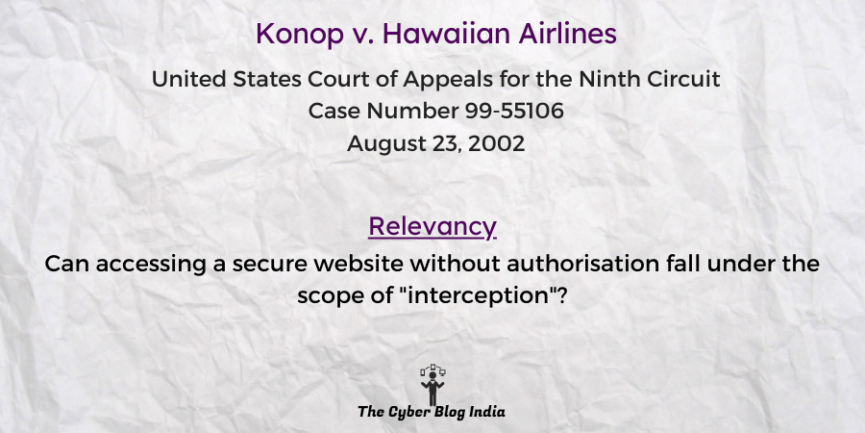Konop v. Hawaiian Airlines, Inc.

Konop v. Hawaiian Airlines
302 F.3d 868
In the United States Court of Appeals for the Ninth Circuit
Case Number 99-55106
Before Circuit Judge Boochever, Circuit Judge Reinhardt, and Circuit Judge Paez
Decided on August 23, 2002
Relevancy of the Case: Can accessing a secure website without authorisation fall under the scope of “interception”?
Statutes and Provisions Involved
- The Electronic Communications Privacy Act, 18 U.S.C. §§ 2511-2520
- The Federal Stored Communications Act, 18 U.S.C. § 2701
Relevant Facts of the Case
- The plaintiff created a secure website critical of the defendant company’s policies. This website encouraged the defendant’s employees to form a separate union.
- The website requires users to log in with their credentials and accept the terms and conditions. The terms and conditions expressly prohibited the company management from viewing the website’s content.
- Two pilots employed by the defendant, who had access to the website, gave access to Davis, the company’s vice president.
- The plaintiff has brought this suit against the defendant for accessing his secure website without permission and disclosing its contents, thereby violating several federal laws.
Prominent Arguments by the Counsels
- The plaintiff’s counsel contended that Davis accessed a stored electronic communication without authorisation. He interfered with the plaintiff’s organising efforts by viewing the website under false pretences.
- The defendant’s counsel argued that the two pilots had the authority to consent to Davis’s use of the website. These two pilots were on the list of eligible users. Further, Davis had a legitimate reason to access the plaintiff’s website – to identify and correct any false or misleading statements.
Opinion of the Bench
- The definition of electronic communication includes transfers but excludes storage. For the plaintiff’s website to be intercepted, it must be acquired during transmission, not while it is in electronic storage.
- No evidence suggests that the two pilots ever used the plaintiff’s website. Therefore, they were not eligible to authorise Davis to use the website on their behalf.
- The defendant has presented little evidence to suggest that any statements on the plaintiff’s website were actually defamatory. Most of them construed rhetorical hyperbole, protected by federal labour laws.
Final Decision
- The court affirmed the District Court’s judgment with respect to the Wiretap Act claim while reversing it on his Stored Communications Act and Railway Labour Act claims.
Satvik Mishra, an undergraduate student at the Rajiv Gandhi National University of Law, Punjab, prepared this case summary during their internship with The Cyber Blog India in May/June 2022.
